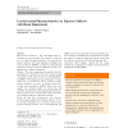[Effects of Long-Term Treatment with Levetiracetam as an Adjunctive Therapy in Japanese Children with Uncontrolled Partial-Onset Seizures: A Multicenter, Open-Label Study].
Mots clés
Abstrait
Following the first period of the multicenter, open-label, single-armed N01223 trial, the second period of the N01223 trial was conducted to evaluate long-term safety, along with the efficacy of adjunctive levetiracetam treatment (individualized dose range, 20-60 mg/kg/day or 1,000-3,000 mg/day) in Japanese pediatric patients with uncontrolled partial-onset seizures (POS). Of the 62 children who completed the first period, 55 children [age: 10.4 ± 3.4 years (mean ± standard deviation)] were elected to enter the second period for a maximum of 39 months. Twenty children were withdrawn during this second period. Frequencies of treatment-emergent adverse events (TEAEs) and adverse drug reactions (ADRs) were 98.2% (54/55 cases) and 27.3% (15/55 cases), respectively. The most common TEAEs were nasopharyngitis (76.4%), influenza (36.4%) and pyrexia (25.5%). The only frequent ADR (>2%) was somnolence (3.6%). Although serious TEAEs and death were reported in 8 cases and 1 case (drowning), respectively, a serious ADR was only reported in 1 case (vomiting). The median percentage reduction and 50% response rate for POS were 43.32% and 41.8%, respectively. One child showed a maximum seizure-free period of 163 days. In conclusion, levetiracetam demonstrated long-term safety and good tolerance with beneficial efficacy as an adjunctive therapy in Japanese children with uncontrolled POS. (Received June 30, 2015; Accepted July 14, 2015: Published November 1, 2015).


